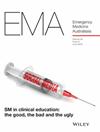Predictors of ICU Admission in Intentional Overdose Presentations to the Emergency Department
Abstract
Objective
To identify predictors of admission to ICU for patients attending the emergency department (ED) after intentional drug overdose.
Methods
A retrospective study examining factors predictive of ICU admission for adults > 15 years presenting to Christchurch ED with intentional overdose between 1 July 2018 and 31 December 2020. Descriptive statistics were used by treating all presentations independently and on a per-patient basis to account for patients with repeat presentations or ICU admissions. Binary logistic models provided odds ratios with 95% confidence intervals. A multivariable logistic regression model which controlled for patients with ≥ 3 ED presentations in the past 365 days was used to determine predictors of ICU admission.
Result
There were 2682 presentations to ED with intentional overdose from 1795 individual patients, with 113 associated ICU admissions (4.2%) involving 103 patients. Overdose was more common in those who were younger, of female sex, or with a mental health history. The rate of overdose by Māori patients was double the rate expected. Older age, reduced level of consciousness, polypharmacy or cardiac drug overdose, and a history of depression, substance abuse or ADHD, ASD, learning difficulties or previous head injury were independently associated with an increased risk of ICU admission. Paracetamol ingestion and a history of ≥ 3 ED presentations in the preceding year were independently associated with a lower risk of ICU admission.
Conclusion
The need for ICU admission in patients presenting with intentional overdose should be identified early to prevent deterioration, promote flow through the hospital, and ensure that ICU beds are utilised appropriately.


 求助内容:
求助内容: 应助结果提醒方式:
应助结果提醒方式:


